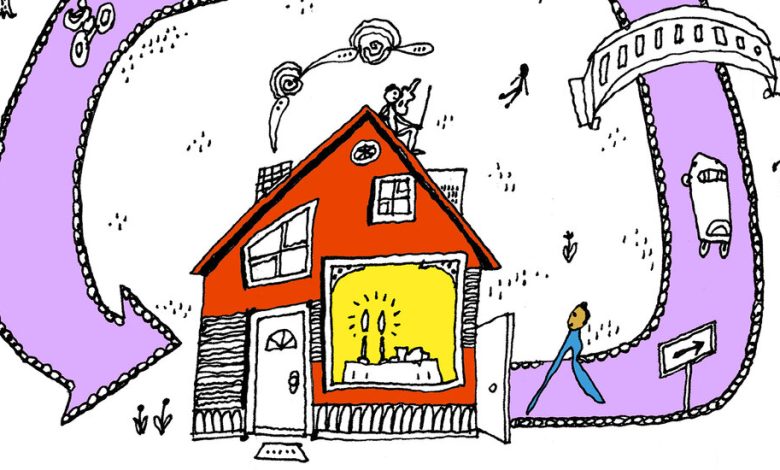I Left My Faith. God Didn’t Flinch.

The first time I intentionally broke a Jewish law, I was in college. It was a Saturday. I glanced around furtively, though I was alone in my dorm room. Then I flicked off the light, an act forbidden on the Sabbath. I flicked it on again. Around me, in the bright quiet, I exhaled.
This transgressive experiment was inspired by a friend who had grown up Orthodox, as I had, but was no longer and had simply begun trying on small heresies. “Once,” my friend said, “I turned off the light on Shabbat. And no lightning struck me down.” Now, having confirmed this, I felt giddy with power.
As time went on, I experimented more liberally. I tried nonkosher food. I took the train on Shabbat. It felt like daring God, saying, “Hey, look what I can do.” But God didn’t flinch. God probably had more important things to do than be mad about my Saturday brunch plans.
I grew up modern Orthodox, meaning my family strictly observed Jewish law, but we weren’t insular. Sure, I couldn’t go out on Friday night or eat cheeseburgers, but — on days other than Shabbat — I could watch TV and go to the mall; my suburban life somewhat resembled that of my non-Jewish counterparts.
But I felt I was missing out. The modest dress code at my all-girls religious school required long skirts. What would it be like to wear jeans? To date an actual boy? Despite my exposure to pop culture, I was sheltered. I had a monster crush on the singer Ricky Nelson, who I did not realize was dead. I had no clue about sex. I conjured a ruddy-cheeked Australian boy I imagined would move in next door, eventually appearing at my window to take me away from all this.
You might not infer any of this from meeting me now. I’m queer, nonbinary, politically far left, lusty about life’s pleasures and effusively irreverent. I live with my cats and my non-Jewish partner. I eat treyf and go Saturday road-tripping to my heart’s content. “I’m ex-Orthodox,” I often say, gaily.
And while technically accurate, “ex-Orthodox” has a scandalous ring to it. It implies wholesale rejection. Escape can be necessary for people leaving much stricter folds of Orthodoxy, but it wasn’t for me. At a fundamental level, I knew I didn’t need to fear familial rejection, even for choosing to part ways with strict Jewish observance. Because I didn’t need to cut any ties, the “ex” in “ex-Orthodox” is simply an additive layer, just beneath my present. An integration, not a disavowal.
Even though I am no longer observant, my religious upbringing is still essential to me. I love ancient Jewish texts and Orthodox deep cuts, that hyperspecific trivia coded for those who share my background. I’m still close with my Orthodox family. As my sister once put it, “You eat treyf, but you’re tight with God.”
She was right.
Fragmentation is central not only to the experience of a shifting relationship with faith but also to queer experience. For some of us, queer life is split in two — a before and a since. Likewise, for some of us who grew up steeped in faith, when there comes an opportunity to test the bounds of our inherited doctrine, we take it, knowing we might never return to the life we once lived. We wonder whether God, in the form of lightning, will strike. More often, I suspect, we simply step over a threshold into some vast unknown.
In truth, in any kind of life, the math is often less binary than “before”and “since”; far more of us have lived many lives, some so disparate as to feel irreconcilable. The desire for wholeness feels at odds with lives that can sometimes feel multiple and contradictory rather than cumulative. How do you integrate, then? Is there space for a whole past, or several, to coexist with so divergent a present?
I, for one, am crowded. Parts of me jostle noisily around. Mostly, the parts of me exist peacefully together. Sometimes, though, I feel disjointed, disconnected.
Jewish holidays with my parents and siblings are beautiful, all festive dishes and rambunctious singing. But the rules remain as strict as they were in my childhood. No driving, no spending money, no electronics. Many blessings. Many rituals. These rules feel somehow alien to me now, even as the beauty and the strictures remain familiar.
Sometimes I host my own holiday gatherings. I’ve hosted queer salons for Shavuot, a holiday dedicated to staying up late studying ancient texts. I’ve hosted queer Rosh Hashana feasts, setting the table with written prompts asking my guests, “What will you try this year? How will you be curious?”
But whereas regularity and consistency are cornerstones of Orthodox Jewish observance, my personal practice these days is haphazard. As much as I love lighting Shabbat candles, in my adult life I rarely remember to do it. I resent my practice. I defend it. I love it. I am a part of it, this half-practice, and it is a part of me.
I still tell anyone who asks that I identify as a religious person, and I feel this truly. I feel it in my insistence that the universe holds more than we can see. I feel it when I’m with a group of people singing and the room grows bigger. I feel it in synchronicities, in the way that, one afternoon, a dear friend and I found ourselves writing about flocks of curlews or in the way a trail I was hiking curved before me in the exact same shape I’d seen in a dream. I feel it when writing fiction feels akin to prayer.
Calling myself religious while living a life unbeholden to Scripture doesn’t make sense, of course. But religious lore made me who I am. Religious observance fueled my neuroses, my obsessions and my imagination. And belief in God has made me, too. God, a relationship I can’t language. God, the ocean. God, a sense of something more. God, the extra inches a room grows when we sing together.
Many of us are composed of lives that shouldn’t exist on the same city block, let alone in the same body. It can seem the only thing to do with years devoted to a life you no longer understand is to grieve them, to experience them only as loss.
But I haven’t lost them. Not that life or the material it was made of. All of the parts that created me are still here. It’s all still here, jostling around, trying to make a cacophonous kind of sense. And sometimes it does make sense. Sometimes the many selves I have been gather with the many selves I hope to be, and it feels less like noise and more like singing. And on the rare occasion when all the parts of me really sing? Without fail, the room around me grows ever so slightly bigger.
Temim Fruchter is the author of the forthcoming novel “City of Laughter.”
The Times is committed to publishing a diversity of letters to the editor. We’d like to hear what you think about this or any of our articles. Here are some tips. And here’s our email: [email protected].
Follow the New York Times Opinion section on Facebook, Instagram, TikTok, X and Threads.



